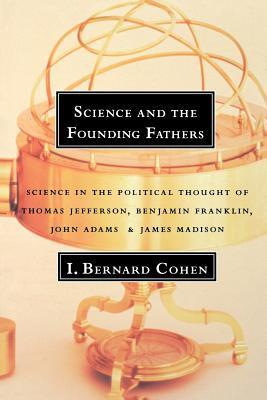This Victor S. Thomas Emeritus Professor of the History of Science at Harvard University cautiously avoids conflating what most of the founders did with their political action and any actual science (as we know it as it mostly is known as, now: lab tests, experiments etc.). Where they did, predominately Jefferson and very much so from Franklin, and to some extent Adams and Madison, we have a firm linkage to that and their political thoughts in a careful, academic and factual manner. He keeps things clear and separate unless they really link. I wished that the author were a bit more lyrical, such as the way Stephen Jay Gould might have treated the subject. Alas, Gould was no science historian in a trained and systematic way.
Where overlaps are made, Cohen provides ample proof or at least much qualitative data to consider. For example, John Adams also studied physics at Harvard, not just law. My take was that Adams's general misuse of laws of motion actually fed other theories of applied physics as they might work in practical politics, thus diverging from classical political science over to perhaps a uniquely American variant of the same.
Though he disagreed with Franklin often (frankly, they did not get along) there was grist for the mill of creative positive action in creating America's hallowed republic between these two, in particular. It is not trivial, as the case that unfolds, shows. Curiously, Adams sold the idea of a senate of "natural noblemen" to Franklin (who detested the idea) on the anti-pure democratic principle of a senate serving to remove the deadlock that would result from the executive branch-to-house of representative in-fighting. That is, seen as the physics of statics, the relation between the house and president would've been a scale: one side or the other would stack the deck to create immovability. That meant, of course, political immovability. The addition of the senate with its votes made a merry go round (a good metaphor for these circuses) of all three. That is, they would never have a deadlock, and debate would be forced between the actors (another fitting description). Though it made a mess, Franklin, I believe, saw the practical point. That "mess" keeps America free in a way Cohen leaves carefully out (that I WILL not) - in imitation of the Iroquois League that gave particularly Franklin and Washington (who fought in the French and Indian War where they witnessed it) the motivation for making a government foundation based on FORCING COMMUNICATION, especially in the house of representatives, where the needs of the least must be considered before the eyes of those who have the most. The Iroquois -whom Franklin had tamely labeled "uncouth savages" in order to sell the idea of how the British might govern the American colonies - had this (I would call) civilized idea c. 300 years before the Europeans ever witnessed it. Europeans and even many born Americans do not see the original Iroquois in American federal political instrumentation. The fact that Franklin had personally invited Iroquois League diplomats and scholar sachems to congressional foundation meetings in the 1775 timeframe to lend their critiques via translation is noted, documented, accepted - and ignored. A House of Representatives Act (in 1982) formally thanks the remnant of that league for its seeding of this very beneficent idea in the hard killer skulls of "civilized Europeans." "Civilization" to the most is still the outcome of increased technological superiority in prosecuting warfare (see the works of John Keegan).
The founders of the American state clearly saw the point. Even if the Iroquois idea was to spare lives that cannot be wasted due to the pre-technological conditions they lived in, we should consider the Adamesque finesse that the STRUCTURE of such a body, so formulated on forcing "talk," will serve to spare ALL LIVES. Adams and company turned the definition of what "civilization" is around - in my estimate - towards a proper orientation.

